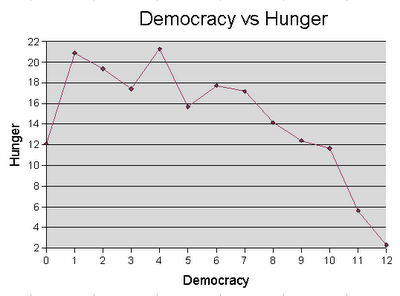However, I may make Professor Rummel happy by noticing that it doesn't matter when it comes to showing what he wants to show. Even though developed countries (and thereby most democracies) are excluded, the data that exists are still so overwhelmingly clear that it is almost scary.

"Hunger" in this graph measured on the IFPRI hunger index and "Democracy" is a measure on how free/democratic countries are on a scale from one to twelve, with the data coming from Freedom house. I simply grouped all countries that had a particular democracy level, and took an average of the hunger index for these countries.
So, simply speaking, if a country is extremely totalitarian or just averagely oppressive doesn't matter, people will still starve. But when countries are moving out from what Freedomhouse calls "Partly Free" into what they call "Free" countries (8-12 on my scale above) we see a significant drop in hunger, that directly follows the level of freedom!
It couldn't be much clearer than that, really. Freedom, baby, yeah.
Kanske intressanta bloggar om: politik, demokrati, svält, rummel

8 kommentarer:
So, how does one place China on this "democracy" scale? China's hunger index is 8.23, but there isn't any starvation in China these days. Instead, China is a food donor.
On the other hand, China is certainly not a democracy. Neither is China a totalitarian state, but rather an authoritarian dictatorship.
Political freedom has not increased much in China, although there has been an explosion in social freedoms.
Thus, I interpret the "democracy" axis as a measure of "(any kind of) freedom/capitalism" rather than democracy per se.
China has a "1" on this scale. The measurement is a combination of political rights, like right to vote, and civil liberties, like freedom of speech. Capitalism doesn't come into it, except marginally as "rule of law", which is necessary for capitalism to work.
See http://www.freedomhouse.org/
You are probably right that economic freedom would give the same result, possibly with even stronger correlation. But it's toolate in the evening for me to do that graph today. :)
Professor Rummel pointed out that my "Democracy-scale" isn't obvious and may be confusing. I'll explain:
Freedom house uses two measurements, one on political rights and one on civil liberties. Both scales go from 7 to 1, where 1 fulfills most of freedomhouses requirements for right and liberties, and 7 fullfills the least. So, 1 is free and democratic and 7 is totalitarian and opressive.
What I did was firstly to add the two measurements, which gives a scale from 2 to 14, where 14 is oppressive dictatorships and 2 is liberal democracies. But I wanted democracy to be at the right end of the scale, so I reversed it. And when I reversed it, I simply just used 0 to 12 instead of 2 to 14, as I thought it was clearer.
But to people familiar with Freedom house, it's of course just confusing. I should have removed the scale and just used labels "opressive" and "democratic" in each end of the scale instead.
Fantastic work. The visual says it all.
Any chance you could also post the actual numbers for the chart?
So, China's hunger index vs freedom index doesn't follow your theory. Therefore your theory is wrong. If there were a correlation, China's hunger index would be in the 20s range, or China's freedom index would be in the 10-11 range.
So, China's hunger index vs freedom index doesn't follow your theory. Therefore your theory is wrong.
No, that does not follow.
So if the people in power are elected and can be hold responsible for their actions, they might try harder to prevent hunger in order to regain voter support and remain in power?
Were there any correlations between presence of market economy and less hunger. If so, one could hypothesise that the more power given to individuals the less hunger there is (since a capitalist market economy could be regarded as having economic power decentralized to the individuals)...
...Sorry, maybe you said so already.
Yes, there was a correlation (sorry for not posting that graph yet) looking very muh like the one for hunger vs democracy.
Both your explanations sound reasonable, those may indeed be at least partial explanations to why hunger is not a problem in the western capitalist democracies.
Skicka en kommentar